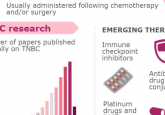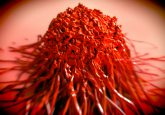ASCO15: Nivolumab in advanced hepatocellular carcinoma – encouraging early-stage results reported
Data concerning both the safety and efficacy of the PD-1 inhibitor nivolumab in patients with hepatocellular carcinoma (HCC) were reported last week at the 2015 annual meeting of the American Society of Clinical Oncology (ASCO; 29 May–2 June, IL, USA). The results of a Phase I/II study were presented, indicating that 19% of evaluable patients (n = 42) responded to the treatment, displaying tumor reduction in excess of 30%.
The multi-targeted tyrosine kinase inhibitor sorafenib is currently the only US FDA approved systemic treatment for advanced liver cancer, a fact that highlights the disease as an area of unmet need in oncology drug development. Sorafenib elicits an objective tumor response in 2% of individuals with advanced HCC, with an average overall survival of 10–11 months.
“We are encouraged to see that nivolumab was safe overall, and the response rate as well as preliminary survival data look quite promising,” reported lead study author Anthony B El-Khoueiry of the University of Southern California Norris Comprehensive Cancer Center (CA, USA). “While we have to verify this early signal in larger studies, this is one of the first signs that immunotherapy with immune checkpoint inhibitors will have a role in the treatment of liver cancer.”
Study participants received 0.1–10 mg/kg intravenous nivolumab every 2 weeks for up to 2 years. Prior to study enrollment, 75% of patients had already received systemic therapy and 68% of these individuals had received sorafenib. The primary endpoint of this dose-escalation study was safety, with secondary endpoints including antitumor activity, pharmacokinetics and immunogenicity.
Overall, 19% of patients responded to nivolumab therapy and two patients had complete responses. These responses were described as durable, with 50% lasting >12 months as the majority of patients continued on treatment. Furthermore, tumor growth halted in 48% of patients, with the longest case lasting beyond 17 months.
Nivolumab therapy was well tolerated in all patients, including those with hepatitis B or C infections. The most common adverse effects reported were mild–moderate, inclusive of abnormal liver enzymes, rash and elevation of amylase and lipase.
“While these results are preliminary and limited to a small number of patients, they remain exciting and provide strong justification for more studies of nivolumab and other immunotherapy approaches for patients with advanced liver cancer,” concluded El-Khoueiry.
ASCO expert Lynn Schuchter (University of Pennsylvania, PA, USA) reiterated the potential importance of these results, but emphasized the need for further study: “PD-1 immunotherapies continue to break new ground in diseases where nothing else seems to work well. The fact that this drug might stop advanced liver cancer in its tracks for months, even a year, is great news for patients. To understand the full impact of this approach, however, larger trials are needed.”
Sources: ASCO press release; LBA101: Phase I/II safety and antitumor activity of nivolumab in patients with advanced hepatocellular carcinoma (HCC): CA209-040.




